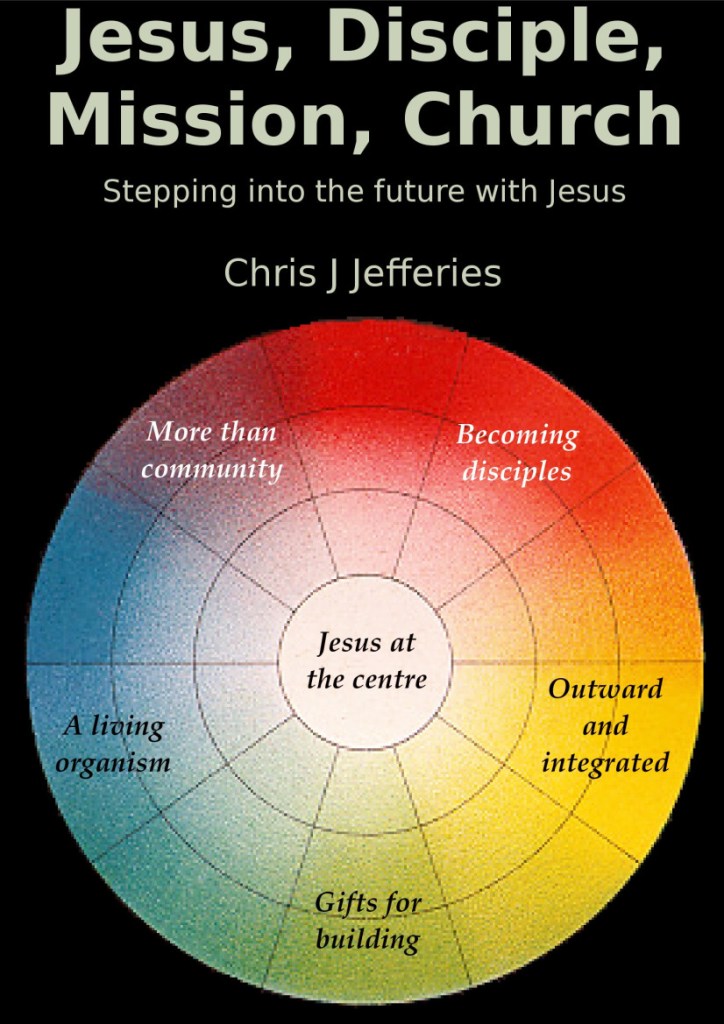This article is an extract from my short book, Jesus, Disciple, Mission, Church (JDMC). The bite-sized piece below is roughly two percent of the book.
Jesus at the centre
We have seen how important it is to keep Jesus right at the heart of everything we do. We have seen that we must follow Jesus alone and that there can be no room for following anyone or anything else.
Without the Holy Spirit we will find this impossible. We receive the Spirit from Jesus as a baptism (Matthew 3:11). In response to our love and obedience, Jesus sends us his Spirit (John 14:15-17). We are not free to defile our bodies because they are ‘temples of the Holy Spirit’ (1 Corinthians 6:19) – and if this is true of our bodies, isn’t it also true of our hearts and minds? The essence of keeping Jesus at the centre is that we know Jesus is Lord of our lives and our thinking and our emotions, of all that we are and all that we do. Yet we can’t even say the words ‘Jesus is Lord’ except by the Holy Spirit (1 Corinthians 12:3).
How has the Spirit helped keep you focused on Jesus? Try to find specific examples rather than generalisations.
Becoming disciples
This is a matter of following Jesus and becoming conformed to his image. Look at the fruit of the Spirit as set out by Paul in Galatians 5:22-26: love, joy, peace, patience, kindness, goodness, faithfulness, gentleness and self-control. This is how the Holy Spirit moulds us to become more Christlike. This is fruit, it grows in us day by day, year by year. And the degree to which we have become conformed is expressed in all we think and say and do.
Doesn’t this sound familiar? Isn’t this the very process of becoming disciples that we are looking for? If we are filled by the Spirit and respond to him we will bear the fruit of the Spirit in every way. We co-operate with the Holy Spirit when we develop a habit of joy or patience or gentleness. Right behaviour over and over again forms those habits of fruitfulness in us. There are two sides to this. We cannot do it in our own strength so we need and depend on the Spirit. But he will not coerce us, he expects to see our obedient willingness to allow him to change us.
Is there spiritual fruit in your life? How might you explain this to someone
who doesn’t yet know Jesus?
Outward and integrated
We need to reach those around us; Jesus commands it. He said, ‘I’ve been given all authority in heaven and on earth, so as you go, make disciples of all nations … and I’ll be with you.’ (Matthew 28:18-20) But as we go out into the world and seek to embed ourselves deep in the culture (as he did), we do not go alone.
Not only are we together as a community of his people, we are also together in the community of the Almighty Creator. The Son has made the way open and has sent the Spirit to fill us – Father, Son, Spirit, and us! It’s not going to heaven when we die; it’s far better than that. It’s living in their community right here, right now and forever. Jesus says he is with us right to the end (Matthew 28:20) and he says that if we have seen him we have seen the Father (John 14:9).
In our going out and going deep we remain in the Presence, for the Holy Spirit is in us and communicates with us and for us. We couldn’t be effective carriers of good news without him. There are some great examples in the New Testament; read Acts 8:26-39, Acts 10:9-21 and Acts 16:7-10.
As you go out and deep in the culture around you, how will you pay
attention to the presence of the Holy Spirit with you? Consider prayer,
listening, and the truth that the Spirit is alive within you and wanting to
communicate with you.
Read the book
This was extracted from Jesus, Disciple, Mission, Church (JDMC), pages 38 and 39. Download the whole thing or read it online – GetJDMC.scilla.org.uk
Useful? Interesting?
If you enjoyed this article, please like, comment, and share below. My material is free to reuse, but a coffee is always welcome! ![]()










